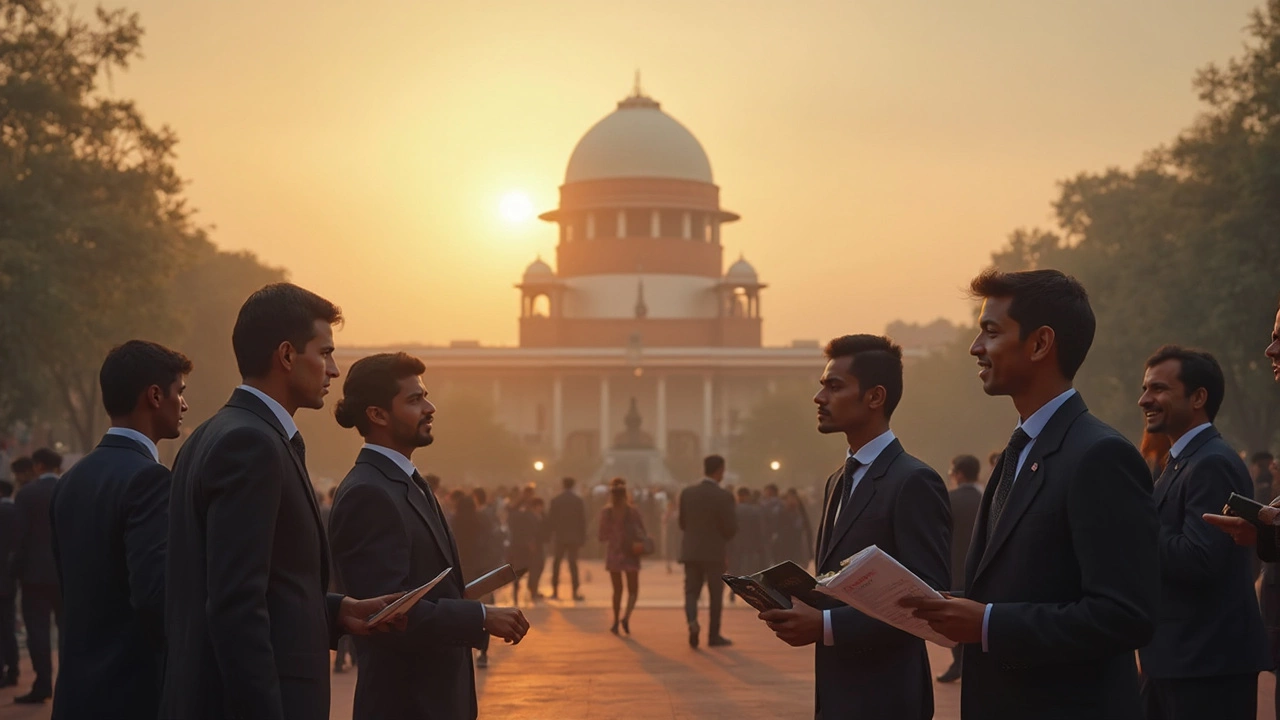Ever wondered which government gig puts the most cash in your pocket? If you’re clearing your desk for government job prep, you probably want to know where the best money is. Forget what your uncle told you about pensions being the only perk—some government jobs now pay better than many private sector roles.
You’ll find some jaw-dropping pay scales in places you might not expect. From top-level civil services jobs to specialist roles in central public sector units, salaries can rival those of big corporate managers. But before you sign up for the next big exam, it’s smart to know where the real money is—and exactly what goes into landing those jobs.
Here’s something nobody tells you: your starting salary might look similar across different roles, but the long-term earning (and those sweet extra benefits) are usually hidden in the fine print. Let’s skip the fluff and get straight to which government jobs really pay the best—and how you can get there.
- Why Salary Varies So Much in Government Jobs
- Top-Paying Government Jobs: Who Makes the Most?
- What It Takes to Get These High-Paying Roles
- Perks Beyond Pay: Extra Benefits You Get
- Smart Moves to Boost Your Salary
Why Salary Varies So Much in Government Jobs
Ever looked at government salaries and wondered why one role pays way higher than another, sometimes even within the same department? It’s not just about your job title. Loads of factors are at play—like which level you work at (central, state, or local), your department, experience, and even where you're posted.
The highest paying government jobs usually sit in specialized zones: think Indian Administrative Services (IAS), Indian Revenue Service (IRS), and certain jobs in PSU giants like ONGC and SBI. Entry-level clerks don’t get the same pay or perks as senior engineers, army officers, or top-tier bureaucrats.
Let’s break down what really decides a government salary:
- Cadre/Service Choice: Central government services—like IAS, IPS, IFS—have higher and more consistent pay compared to state government roles.
- Pay Commission: Every few years, the Pay Commission changes the pay structure. The 7th Pay Commission (2016) gave a significant hike, bumping up salaries across the board.
- Seniority & Promotions: Promotions make a huge difference. An IAS officer promoted to a Secretary-level post sees a massive jump in earnings and bonuses.
- Special Allowances: Jobs in tough locations (like northeast India or remote border posts) often get special location perks. Defense, railways, and police roles fall under this.
- Technical vs. Non-Technical Roles: Engineers, doctors, and scientists often land higher pay than generalist posts, especially in PSUs and research organizations.
Here’s a quick example to clear things up:
| Job Position | Monthly Basic Pay (INR) | Key Allowances |
|---|---|---|
| IAS Officer (Entry Level, Central Govt.) | ₹56,100 | House Rent, DA, Transport |
| Clerk (State Govt.) | ₹19,900 | Limited |
| Executive Engineer (PSU) | ₹60,000+ | HRA, DA, Special Allowances |
| Constable (Central Police) | ₹21,700 | Uniform, Risk, Transport |
Don’t forget perks can make the final number much bigger—free housing, medical, official vehicles, and sometimes even education for your kids. So if you’re eyeing a government job for the money, always look beyond just the basic pay.
Top-Paying Government Jobs: Who Makes the Most?
If you’re chasing the biggest paychecks in government, here’s the real scoop. These aren’t just steady jobs—they come with a pay scale that can make even private sector folks raise their eyebrows.
Let’s look at the jobs that put you in the top earning bracket. The top three are:
- Indian Administrative Service (IAS) Officers: The go-to answer for anyone asking about highest paying government jobs. The salary starts at around ₹56,100 per month (basic), but with added benefits and allowances, many draw over ₹1.5 lakh per month after a few years.
- Indian Foreign Service (IFS) Officers: Their pay matches that of IAS officers, but perks are even better, especially when posted abroad. Overseas postings come with huge allowances, sometimes tripling the take-home pay—think ₹2 lakh to ₹3 lakh per month, tax-free in some cases.
- Public Sector Undertaking (PSU) Executives: Think companies like ONGC, NTPC, BHEL. They hire through exams like GATE. Top-level executives (Chairman, Directors) easily earn ₹2 lakh to ₹3 lakh per month, and senior engineers/managers can cross ₹1 lakh per month fast.
Central government also pays well in specialized roles:
- Indian Revenue Service (IRS): Officers start at ₹56,100, but the perks (housing, transport) push the real value higher. Promotions are steady, and top posts go beyond ₹2.2 lakh per month.
- Defence Services (Armed Forces): Senior army, navy, or air force officers make ₹1.5 lakh to ₹2.5 lakh per month with all allowances—while also getting free accommodation, rations, and vehicles.
- Scientists at ISRO/DRDO: Yes, research pays good too. Senior scientists can make upwards of ₹1.5 lakh per month, and a Project Director or above often draws close to ₹2 lakh per month.
Here’s a quick table showing what these top government jobs bring home on average every month (including perks and allowances):
| Job Title | Monthly Total Salary (₹) | Main Perks/Allowances |
|---|---|---|
| IAS Officer | 1,50,000 - 2,50,000 | Official car, bungalow, household staff |
| IFS (Foreign Service) Officer | 2,00,000 - 3,00,000 (abroad) | Foreign posting, tax-free perks, luxury housing |
| PSU Executive (Top Level) | 2,00,000 - 3,00,000 | Performance bonuses, transport, housing |
| IRS Officer | 1,50,000 - 2,20,000 | Official car, housing, travel |
| Defence Services (Colonel+) | 1,80,000 - 2,50,000 | Accommodation, rations, vehicle |
| ISRO/DRDO Scientist (Senior) | 1,50,000 - 2,00,000 | Research funding, housing, bonuses |
Here’s something many miss: higher pay in government often comes after promotions and years of proven work, but even with starting pay, these jobs include perks that private companies rarely offer. So, if you’re aiming for a career with both job security and top-tier earning, these are the ones to beat.

What It Takes to Get These High-Paying Roles
Getting one of the highest paying government jobs isn’t just a stroke of luck. The top spots, like Indian Administrative Service (IAS) officers, Public Sector Undertaking (PSU) managers, or RBI Grade B officers, come with demanding entry barriers. Most of these require you to ace a national-level exam, outshine in interviews, and sometimes clear medical or physical tests.
Let’s break down what you actually need to do to snag one of these roles:
- Civil Services (IAS, IPS, IFS): The UPSC Civil Services Examination has three massive hurdles—Prelims, Mains, and the Personality Test. Prelims knock out about 95% of applicants each year. Yes, it’s that tough.
- PSU Jobs (through GATE): Dream jobs in NTPC, ONGC, or IOCL? You’ll have to nail the GATE exam. Toppers from top engineering colleges are your competition—and only the best scores get called for interviews.
- Banking (RBI Grade B, NABARD): For RBI Grade B, you deal with three stages: Phase I, Phase II, and Interview. Out of roughly 1-2 lakh applicants, only around 150 make the final cut for RBI Grade B each year. NABARD runs a similar process for its high-salary jobs—and hundreds chase a handful of seats.
- Defence Services (Armed Forces Officers): You must clear the Combined Defence Services (CDS) exam, followed by SSB interviews and medical rounds. The process is strict—physical fitness is non-negotiable.
Here’s a quick look at the required qualifications and average selection ratios for top-paying government roles:
| Role | Qualification | Selection Ratio | Exam |
|---|---|---|---|
| IAS/IPS | Any Graduate | Approx. 1 in 500 | UPSC CSE |
| PSU Engineering Jobs | B.Tech/B.E. | Approx. 1 in 200 | GATE |
| RBI Grade B | Any Graduate | Approx. 1 in 1000 | RBI Grade B Exam |
| Indian Forest Service | Bachelor’s in Science/Engineering | Approx. 1 in 1200 | UPSC IFS |
| Defence Officers | Any Graduate | Approx. 1 in 300 | CDS, SSB |
Most of these roles expect a strong academic track record and next-level dedication. Toppers spend 8-10 hours daily prepping for anywhere from a year to three years. Also, don’t underestimate the interviews—tough panels test not just your knowledge, but your personality and stress handling.
One more tip: never skip practice tests and mock interviews. Almost everyone who cracks these exams swears by serious mock prep. It gets you used to the time pressure and pinpoints your weak spots before the real deal. If you’re aiming for the big salaries, preparation isn’t optional—it’s your ticket in.
Perks Beyond Pay: Extra Benefits You Get
High government job salaries are only half the picture. The real edge? All those hidden perks and extras stacked on top of your regular paycheck. Let’s call it what it is: security, comfort, and benefits that folks in most private jobs can only dream of.
You get way more than just the basic salary. Here’s a look at the typical extras rolled out for most top-level government jobs in India:
- Pension for Life: Even after you retire, you keep getting a monthly income. This is gold—private sector jobs rarely match it now.
- Medical Protection: Central Government Health Scheme (CGHS) and other healthcare setups cover almost all your major medical bills—yours and your family’s too.
- House and Car Allowances: Senior officers often get official homes in good locations, and a car with driver. No long commutes in traffic, and no rent stress.
- Leave Travel Concession (LTC): This lets you and your family travel around India for free or at big discounts.
- Job Security: Unless you do something seriously wrong, it’s nearly impossible to get fired. Transfers happen, but layoffs almost never do.
- Easy Loans: Need money for a house or car? Government banks offer lower interest rates for employees.
- Education Support: Some government departments offer scholarships for your kids—less student loan worry later.
Here’s a quick look at how some of these benefits stack up, based on 2024 policies:
| Benefit | Typical Value | Who Gets It? |
|---|---|---|
| Pension | 50% of last drawn salary (monthly after retirement) | All permanent employees who joined before 2004; NPS for others |
| Medical Cover | Up to full reimbursement of bills under CGHS | Central govt employees & families |
| Official Accommodation | Market rent value from ₹15,000–₹1,00,000/month saved | IAS, IPS, and Group A officers |
| Car Benefit | Official vehicle with or without driver | Senior officers (Group A/B) |
| LTC | 2–4 free trips per year, family included | All permanent employees |
There’s also peace of mind that comes with knowing your job is protected, your health care is sorted, and your retirement is covered. That’s why the total package of a top-shelf government job is often worth a lot more than just the monthly paycheck you see in your account.

Smart Moves to Boost Your Salary
If you're serious about leveling up your government paycheck, you've got a few practical options that really work. Don't just rely on waiting for annual increments. Proactive steps can actually push you closer to the top highest paying government jobs before you know it.
Start by focusing on promotions and departmental exams. In services like IAS, IPS, or Revenue, every promotion comes with a big pay bump and extra perks. Departmental tests are the main doorway—so if your department holds regular promotional exams, clear them as soon as you’re eligible. If you aren’t sure, just ask your HR or seniors (they had to do it too!).
- Upgrade your qualifications: Grabbing additional degrees, certifications, or even an MBA can sometimes move you up a pay grade in certain departments. For technical posts, postgraduate degrees and special training carry real value.
- Switch cadres or services: Some government jobs allow you to move laterally between departments or apply for “higher” posts. Keep an eye on notifications from UPSC or SSC for internal transfer or upward mobility options.
- Target specialist positions: Roles like Engineers in PSUs, medical officers, and scientists in DRDO or ISRO usually have higher entry salaries and faster increments. These jobs need extra entrance exams or expert skills, but the money is worth the effort.
- Look for deputations and central postings: Deputation to central government or foreign assignments can almost double your regular salary for that period. External postings (like embassies) have fat allowances and perks.
- Never skip appraisals: Most government workers miss out on annual performance bonuses or special project allowances because they forget to file paperwork or follow up. Stay on top of your reviews and always ask if you qualify for extra incentives.
Here’s a quick look at how various actions add up in terms of annual salary—you’ll notice some moves are real game-changers:
| Move | Possible Annual Boost (INR) |
|---|---|
| Clearing a departmental exam for promotion | ₹80,000 - ₹2,00,000 |
| Achieving a foreign deputation/posting | ₹4,00,000 - ₹10,00,000* (including extra allowances) |
| Switching to a specialist cadre (like PSU engineer) | ₹1,20,000 - ₹3,00,000 |
| Earning special project bonuses/allowances | ₹30,000 - ₹1,00,000 |
*Depends on country/location
Bottom line: Stay curious, network with higher-ups, and never sit still. In any government job, being proactive about every opportunity usually pays better than just showing up and waiting for the next annual pay letter. Your moves today decide how fat your future paycheck gets.
